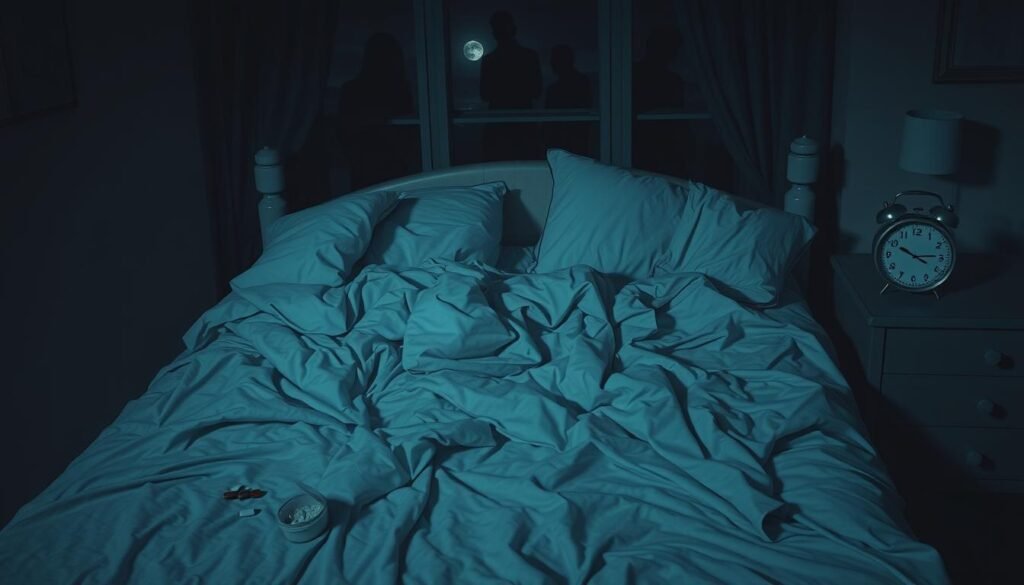Do you ever wonder why we often miss mild depression symptoms in everyday life? It affects about one in ten people at some point. It’s key to know about this because it can really affect one’s mental and emotional health.
Mild depression means feeling low for two weeks or more. This can cause psychological distress if not handled. Spotting these signs early is vital to stop it from getting worse. This article talks about the emotional and psychological aspects of mild depression. It looks at the common symptoms that people face. The National Institute of Mental Health says acting early can greatly help in improving the situation.
Anyone can be hit by mild depression, no matter their age or where they come from. Things in society and personal problems can make the risk higher. This article aims to make readers more aware of mild depression symptoms. It will also talk about how to deal with them to better your emotional health.
Key Takeaways
- Mild depression symptoms affect around 10% of people during their lives.
- Recognizing symptoms early is key to effective intervention.
- Mild depression can be managed through lifestyle changes and professional help.
- Symptoms may include fatigue, low mood, and difficulty concentrating.
- Loneliness and socio-economic factors can increase the risk of mild depression.
What is Mild Depression?
Mild depression is a lighter version of major depressive disorder (MDD), as stated in the DSM-5-TR. It involves having at least five of the nine depression symptoms. However, these symptoms are less severe and don’t greatly disrupt daily life. Symptoms can include feeling sad, having little energy, feeling tired, and changes in how much you eat.
Knowing what mild depression is, is key for those feeling these signs and for doctors. It tends to start slowly and might not be obvious, which makes it hard to spot. If not treated, mild depression can get worse, affecting one’s everyday life and happiness.
Recognizing Mild Depression Symptoms
Spotting signs of mild depression is key to better emotional health. People might find themselves losing interest in everyday activities. This leads to feeling detached or uncaring. Symptoms often include low energy that rest doesn’t fix. Many feel constantly tired. Feeling irritable can be another clue, one others might not notice.
The concept of “smiling depression” makes it harder to see the problem. Some look happy on the outside but struggle deeply inside. Knowing these signs is vital for dealing with them effectively. It’s important to understand depression affects everyone, no matter their age or where they come from. This shows how crucial self-awareness and support networks are.
When signs of depression pile up, life’s quality can drop even without extreme symptoms. Depression looks different in everyone, needing unique responses. Women get diagnosed more, but men may not talk about their feelings as much. Recognizing these differences helps people explain what they’re going through. It leads to better help and ways to manage the condition.
Mild Depression Symptoms
Mild depression has a range of signs that impact well-being. People often feel sad and low every day. This sadness makes getting motivated hard, especially for once-loved activities. Also, they feel tired and lack energy, even after sleeping well. Spotting these mild depression signs is crucial for those affected.
Low Mood and Feelings of Sadness
A key sign of mild depression is feeling sad and low. This sadness can make life seem less colorful, leading to an empty feeling. If not addressed, these feelings can get worse, hurting relationships and life quality.
Lack of Motivation in Daily Activities
Many with mild depression lose interest in fun activities. It becomes hard to do things they used to enjoy, making them pull back. This cycle of not wanting to do anything can make the sadness worse, trapping them in a tough spot.
Fatigue and Reduced Energy Levels
Feeling extremely tired is common in mild depression. Even with enough rest, basic tasks seem huge because of this tiredness. This drop in energy affects doing daily tasks and lowers mental sharpness, which adds to the struggle.
Impact of Sleep Disturbances
Sleep issues deeply affect our mental well-being, especially for those dealing with depression symptoms. People with insomnia have a much higher chance of getting depression. Nearly 75% of those battling depression also struggle with sleep, whether falling asleep or staying asleep. This leads to a cycle where bad sleep makes mood problems worse.
The link between sleep and depression is complicated. Those with sleep apnea see their depression risk soar. Depression can also reduce deep sleep, essential for mental health. Stress can make it hard to stay asleep at night, worsening one’s mental state.
It’s key to tackle sleep problems to fight depression effectively. Using CBT-I or CPAP devices can greatly improve sleep and lower depression risk. Yet, those in depression treatment who still face sleep issues are more likely to have setbacks. Research shows that adding CBT-I to depression care enhances sleep and may help recovery.
- Most people with depression, up to 80%, suffer from insomnia.
- Around 20% of depression patients have obstructive sleep apnea.
- About 15% are dealing with hypersomnia.
Building good sleep habits can lessen depression’s negative effects. Day activities like regular workouts can cut down depression signs and boost sleep quality. Focusing on better sleep can help individuals manage their mental health more effectively.

Understanding Appetite Changes
Appetite changes can show how we feel inside, especially if we’re a bit down. When our mood swings, it affects how much, or how little, we eat. This can make our weight go up or down. Learning about this link helps us understand our eating patterns better.
Weight Fluctuations Related to Mood
Emotions play a big role in our eating habits. Some of us eat more when we’re feeling down, which can make us gain weight. Others might not feel like eating at all, which can lead to weight loss and missing out on important nutrients. This is especially risky for older people who may not feel hungry often.
How Appetite Affects Energy and Mood
Knowing how what we eat affects our energy and feelings is key to staying happy and healthy. Shifts in our hunger can upset our body’s balance, changing our mood and energy level. Eating regularly with friends or family can make us feel better and strengthen our bonds. It stresses the importance of eating mindfully.
Difficulty Concentrating and Decision Making
Mild depression can greatly change how a person thinks. It can make it hard to concentrate and make decisions. People may get lost in negative thoughts and feelings. This messes with their focus at work and in life. It makes stress and feelings of not being enough worse.
A lot of people with depression struggle with brain fog. Studies show it happens to 85% to 94% of them. Even after getting better, 39% to 44% still have problems with their thinking. This can mess up daily life and hurt friendships. People have trouble connecting with others.
Depression can make it hard to plan, organize, and do tasks. About 20% to 30% of depressed people have these problems. It makes deciding anything hard. Even small daily choices or big life decisions become a challenge.
Knowing about these thinking problems is important. It helps people look for the right help. Therapies like CBT and changing some habits can help a lot. They learn how to deal better with these challenges. This not only helps with depression symptoms. It also makes everyday life better.

The Role of Irritability in Mild Depression
Irritability in depression can greatly disrupt day-to-day life. Those with mild depression may experience intense emotional reactions. These reactions can appear as quick to anger or frustration.
This can harm relationships and affect how one acts at work.
About half of those with Major Depressive Disorder feel irritable when mildly depressed. It’s more common in young adults and students. Their peers and teachers need to be more aware and understanding.
Seeing irritability as a part of your emotions doesn’t mean you’re weak. It shows there’s something wrong inside. Learning how to handle these feelings helps improve relationships. By seeking guidance, one can work towards better mental health.
When to Seek Help for Mild Depression Symptoms
Knowing when to get help for depression is key. It’s important to check on your emotional health often. If you see changes in your mood for over two weeks, it’s time to get support. These changes, if they get in the way of daily life, are especially concerning.
The American Psychiatric Association says mild depression is like severe depression, but not as strong. It shows up as mood swings and changes in how you act, which can be hard to spot. The National Institute of Mental Health talks about different depressions, like persistent depressive disorder and seasonal affective disorder.
If you’re feeling mild symptoms, ask yourself:
- Are symptoms affecting my everyday life?
- Do I have a family history of depression or other mental health issues?
- Have I faced recent trauma or significant life changes?

Deciding when to consult a professional is crucial. Sometimes, changing your lifestyle isn’t enough. If that’s the case, think about counseling or medication. Treatments like psychotherapy and cognitive behavioral therapy (CBT) are effective in changing negative thoughts.
Nearly 17.3 million adults had depression in 2017, says the National Institute of Mental Health. Getting help early is essential. It can handle symptoms better and stop them from getting worse. Being proactive improves recovery chances a lot.
| Symptoms | Advice for Seeking Help |
|---|---|
| Persistent sadness | Seek consultation to assess needs and treatment options. |
| Fatigue | Consider lifestyle modifications; if ineffective, consult a healthcare provider. |
| Loss of interest in activities | Participate in support groups or talk to a mental health professional. |
| Changes in appetite | Monitor patterns; discuss changes with a doctor. |
| Difficulty concentrating | Document symptoms over time; bring this information to appointments. |
Effective Strategies for Managing Symptoms
To manage depression symptoms well, mix lifestyle modifications and therapeutic steps. Adding behavioral strategies to your daily life can really help your mental health. Make sure your routine has regular exercise, good food, and enough sleep to help your mood.
Lifestyle Modifications
Working out is key. Studies show 30 minutes of exercise each day can really help with depression symptoms. Even just a short walk can boost your mood for a couple of hours. Activities like walking, swimming, or dancing are great because they have a rhythm.
Getting at least 15 minutes of sunlight a day can also help by upping your serotonin levels, making you feel better.
- Set small, reachable goals to feel successful.
- Do activities that are meaningful to keep your energy up.
- Being outdoors in nature can make you happier.
- Meeting up with people can make you feel less alone.
- Meditating and doing yoga can keep you mindful.
Therapies and Treatments Available
Looking into therapy can give you custom ways to deal with depression. Cognitive-behavioral therapy (CBT) works on changing bad thought patterns to better ones. You can also try writing down feelings, helping others for social connection, and being thankful to boost your mood. These behavioral strategies help make you emotionally stronger and decrease depression.
| Strategy | Potential Benefits |
|---|---|
| Regular Exercise | Improves mood, prevents relapse, boosts energy levels |
| Mindfulness and Meditation | Enhances feelings of connection, reduces anxiety |
| Dietary Changes | Improves overall mental health, supports energy levels |
| Social Engagement | Combats isolation, enhances support network |
| Gratitude Practices | Encourages positive thinking, improves emotional well-being |
Conclusion
Understanding mild depression is key to better mental health and happiness. It affects daily life but still lets people function. Knowing the symptoms helps people seek help early. They can find ways to better their lives.
Mild depression impacts 2% to 4% of people everywhere. We need to work together to notice and help with mental health issues. By increasing awareness, we make it easier for people to seek help. For more info, check out this conclusion on mild depression.
Early help and good coping strategies are vital. About 20% might face major depression or dysthymic disorder in their lives. Support can change lives. Let’s keep focusing on mental health to aid healing and understanding.